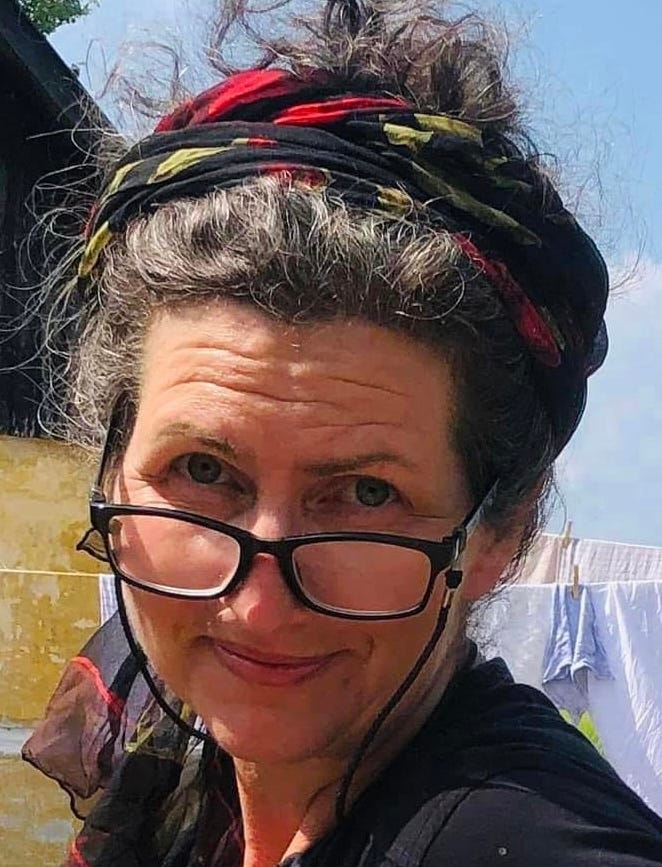The Word is Woman #61
A guest post about proposed erasure of women from Swedish abortion law.
“If the word ‘woman’ is erased, the woman herself becomes invisible”
This week we depart from our usual format at TWIW to hear from two writers and activists, Kristina Turner and Jacqueline Vejlstrup, about the proposal to remove the word ‘woman’ from abortion law in Sweden. When I read their piece, first published in Swedish broadsheet Dagens Nyheter (DN), I thought it was so clear and compelling that I asked their permission to share it here with you. It truly gets to the heart of the language issue that TWIW is concerned with.
How can we defend the right to abortion as a health and gender equality issue if the women who need abortions are not even referred to by their proper name?
Swedish abortion law is set to be updated, including its language. The word "woman" is being replaced with gender-neutral terms. The intention may be commendable, but when women disappear from language, their rights risk following the same path. Why is it always women—and not men—who are expected to be accommodating in the name of inclusion? two commentators ask.
Swedish Minister of Health Acko Ankarberg Johansson (KD) recently received the final report from the Inquiry into Changes in Abortion Legislation (S 2023:06). The report contains several positive proposals for ensuring safe and accessible abortion care. However, it also suggests a linguistic modernization of the law, where the word “woman” is replaced by the gender-neutral term “pregnant person”.
In Denmark, an intense debate about gender and women's rights has been ongoing among midwives since the word "woman" was removed from health legislation in 2013. Thanks to pressure from the Danish Midwives' Association and the Women's Council, as well as broad public discussion, the word will now be reintroduced in Danish abortion law—without excluding individuals with other gender identities.
Sweden is moving in the opposite direction, erasing the word "woman" from legislation specifically concerning the female body, despite growing international awareness of how linguistic changes affect women’s health and rights socially, medically, and legally.
The removal of the word "woman" is intended to include trans-identified individuals, with the argument that this wording would cover all individuals with a uterus, regardless of gender identity. However, the consequence is that women become invisible in language—and consequently, also in legislation.
The core responsibility of midwives is to prioritize the health and safety of pregnant and birthing women. Clear and familiar language is a fundamental part of this work. When gender-neutral terminology is introduced into legislation, understanding becomes more difficult for bilingual individuals and those with reading difficulties—a group which is much larger than many realize.
The reluctance to use the word "woman" in abortion law reflects a postmodern view where categories such as "woman" and "man" are actively deconstructed through gender-neutral language. This has led to the use of inventive new terms such as "uterus carriers" and "menstruators", where biological realities are replaced with technocratic terms, erasing women’s specific experiences and rights.
Biological sex is a central category that globally defines women’s subordination. One cannot identify out of a child marriage, a stoning, genital mutilation, or an unwanted pregnancy.
By dissolving the category "woman" in language, the sex that holds less power and has historically faced systematic oppression for centuries is erased. Without a clear definition of women as a political category, it becomes impossible to address structural issues such as violence against women, lack of access to reproductive rights, and gender-based wage gaps.
How can we defend the right to abortion as a health and gender equality issue if the women who need abortions are not even referred to by name? Language is crucial for highlighting structural injustices and ensuring effective solutions. If we erase the word “woman” from legislation and healthcare policy, we risk erasing the specific needs and rights of women. You cannot fight a problem that you cannot name.
One of the great paradoxes of postmodern identity politics is that its ideas are presented as purely positive in the fight for inclusion and justice. But in practice, we see that it is always women—and rarely men—who are expected to be accommodating, giving up their political and social categories in the name of inclusion.
“What is lost today will be difficult to regain tomorrow.”
We have seen examples of women’s compliance in several contexts worldwide: In sports, trans women compete against biological women at local, national, and international levels. In women's prisons, (violent) trans women are placed together with (abused) biological women, sharing living spaces, bathrooms, and sleeping quarters. In certain lesbian circles, debates have arisen about the term "The Cotton Ceiling," where some trans activist voices claim it is transphobic to choose sexual partners based on biological sex rather than gender identity.
The same pattern can be seen on social platforms exclusively for XX-women, where trans women—with the approval of the legal system—have forced their way in, as in the case of the "Giggle for Girls" app in Australia. This, along with countless other examples, reveals a power structure where women’s interests and rights are systematically deprioritized and diminished.
That one of the first executive orders issued by newly elected U.S. President Donald Trump included a biologically based definition of “sex” will undoubtedly lead many on the left to dismiss this criticism of the linguistic changes to abortion law’s as reactionary. But feminists’ long-standing, thorough criticism of identity politics and its dismantling of women’s rights has not suddenly become “reactionary” just because right-wing actors have also begun to highlight extreme trans activism. On the contrary, this critique has demonstrated striking foresight.
The fact that some individuals identify as a different gender does not change the biological reality that abortion concerns only those with female reproductive anatomy. We are not criticizing trans people’s right to healthcare, but rather the linguistic changes that erase the group that has historically fought for—and still needs—strong legal protection of their reproductive rights.
Inclusion can and should never come at the expense of the group that constitutes the majority of those affected by abortion laws. Language shapes legislation, policy, and societal norms—and when women’s existence is erased from language, their rights risk following the same path.
We must take this fight now. What is lost today will be difficult to regain tomorrow.
Kristina Turner, Author and Feminist Commentator
Jacqueline Vejlstrup, Danish Midwife and Founder of Roskilde Fødeklinik
Kristina Turner is a writer, birth activist, and women’s circle facilitator with over 25 years of experience. She is the author of Natural Birth – A Holistic Guide to Pregnancy, Childbirth, and Breastfeeding and Revolution i BB-fabriken (Revolution in the Maternity Factory).
Through her holistic birth support brand, Braïdo Organics, Kristina empowers women to experience transformative, undisturbed births. She is a trained Sacred Birthkeeper and Red Tent women’s circle facilitator, actively working in Sweden and the UK to support women on their birth journeys.
📍 @sacredbirthkeepersweden
🌿 braidoorganics.com
Jacqueline Vejlstrup is a Danish midwife and a co-founder of midwife-led cooperative MLA Roskilde Fødeklinik.
She is a long-standing birth activist and a well-known figure in Danish and Scandinavian media as an outspoken advocate for women’s right to choice in childbirth. In 2016, Jacqueline co-wrote Sweden’s shadow report on Sweden's maternity services to the UN Committee on the Elimination of Discrimination against Women (CEDAW).
Please like, share or subscribe to support my work on this substack. It’s appreciated!
And if you would like to write a guest post for this substack, please do get in touch.






What is not admitted here, and is rarely mentioned because it is unmentionable, is that at the core of this is patriarchal rage that babies belong to women and not to men. Because of this simple fact, the future is ours, and not theirs.
The fact that we have the babies by biological necessity is the reason why we are oppressed, along with men’s need for sex. The domestic services we provide for free to the men who live with us are just an added extra. Babies belong to women. Men can only know who their babies are by curtailing women’s sexual freedom - that is what marriage is about. If they don’t stay close to a woman and ensure her sexual monogamy they won’t know who their children are.
Nature wasn’t set up to do this - naturally the men would be long gone by the time babies arrived, and women got all the support they needed from their own birth families: their mother, sisters, brothers, uncles and aunts. In fact that support was much more reliable and consistent than any from a man you had sex with nine months ago. This is why women were forced to go to their husbands family to live, so that she was separated from that support system and reliant on a new family who didn’t necessarily care about or for her: it made her weak and reliant on her husband during a period of need.
The patriarchy has to make new mothers as weak as possible so that they can claim the babies. It is true that as a general rule they would rather not be involved with the bringing up of those babies, especially at the nappies stage, but even this is being renegotiated as women are voting with their feet and not tying themselves irrevocably to the man they had sex with nine months before their baby arrived.
The idea of surrogacy has finally broken the link that nature puts in place to give babies their best chance of survival in as healthy a way as can be. The physical and emotional links between a mother and her babies is unimaginable by those who do not experience it as a mother. Of course most of us experience it as babies, but it is pre linguistic and so forgotten, and our society breaks the link as soon as it can with women going “back” to work, ie. not doing the work that they can do better than anyone else (looking after their own baby, with support) and handing that work to other women who are paid to do it less well in nurseries and schools.
Surrogacy doesn’t even give a nod to this wonderful process of nature creating a fabulous carer for their children, and pretends that this link can be broken with the payment of some money and recreated by the need of selfish adults to pretend that they can magic up that relationship artificially. This is not to deny the wonderful work done by those who care for babies whose mother cannot care, through ill health or death. Those people are amazing and should be celebrated, but to create motherless babies so that you can pretend to be a mother is a crime against humanity.
And the “gestational carrier”, “birthing patient”, “breastfeeding families” nonsense is that patriarchy’s latest weapon to separate us from our babies. To pretend that women are the exactly the same as before they became pregnant but happen to be carrying a bag with a baby in is a lie. To pretend that the only difference between mothers and fathers is that one of them suddenly gives birth but otherwise everything is the same, is a lie. To pretend that an entire family breastfeeds a baby, or even that men can do it with the help of a cocktail of drugs, is a lie. These are all lies that weaken the link between women and their babies because this is our superpower, and the patriarchy knows that its own destruction lies in our knowing that and having the power to act on it.
“Pregnant people”—one I especially dislike.